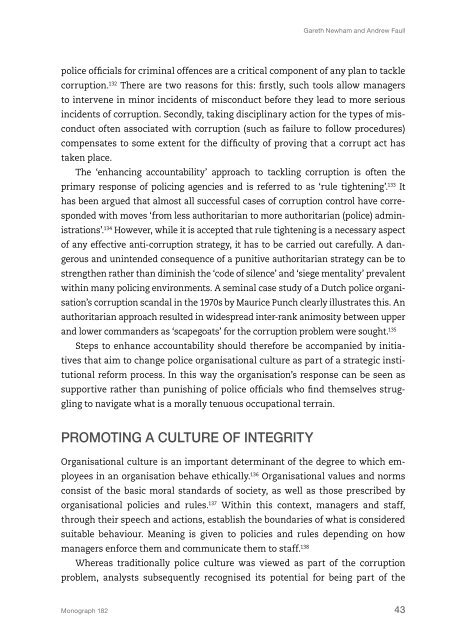Protector or predator? - Institute for Security Studies
Protector or predator? - Institute for Security Studies
Protector or predator? - Institute for Security Studies
Create successful ePaper yourself
Turn your PDF publications into a flip-book with our unique Google optimized e-Paper software.
Gareth Newham and Andrew Faull<br />
police officials f<strong>or</strong> criminal offences are a critical component of any plan to tackle<br />
c<strong>or</strong>ruption. 132 There are two reasons f<strong>or</strong> this: firstly, such tools allow managers<br />
to intervene in min<strong>or</strong> incidents of misconduct bef<strong>or</strong>e they lead to m<strong>or</strong>e serious<br />
incidents of c<strong>or</strong>ruption. Secondly, taking disciplinary action f<strong>or</strong> the types of misconduct<br />
often associated with c<strong>or</strong>ruption (such as failure to follow procedures)<br />
compensates to some extent f<strong>or</strong> the difficulty of proving that a c<strong>or</strong>rupt act has<br />
taken place.<br />
The ‘enhancing accountability’ approach to tackling c<strong>or</strong>ruption is often the<br />
primary response of policing agencies and is referred to as ‘rule tightening’. 133 It<br />
has been argued that almost all successful cases of c<strong>or</strong>ruption control have c<strong>or</strong>responded<br />
with moves ‘from less auth<strong>or</strong>itarian to m<strong>or</strong>e auth<strong>or</strong>itarian (police) administrations’.<br />
134 However, while it is accepted that rule tightening is a necessary aspect<br />
of any effective anti-c<strong>or</strong>ruption strategy, it has to be carried out carefully. A dangerous<br />
and unintended consequence of a punitive auth<strong>or</strong>itarian strategy can be to<br />
strengthen rather than diminish the ‘code of silence’ and ‘siege mentality’ prevalent<br />
within many policing environments. A seminal case study of a Dutch police <strong>or</strong>ganisation’s<br />
c<strong>or</strong>ruption scandal in the 1970s by Maurice Punch clearly illustrates this. An<br />
auth<strong>or</strong>itarian approach resulted in widespread inter-rank animosity between upper<br />
and lower commanders as ‘scapegoats’ f<strong>or</strong> the c<strong>or</strong>ruption problem were sought. 135<br />
Steps to enhance accountability should theref<strong>or</strong>e be accompanied by initiatives<br />
that aim to change police <strong>or</strong>ganisational culture as part of a strategic institutional<br />
ref<strong>or</strong>m process. In this way the <strong>or</strong>ganisation’s response can be seen as<br />
supp<strong>or</strong>tive rather than punishing of police officials who find themselves struggling<br />
to navigate what is a m<strong>or</strong>ally tenuous occupational terrain.<br />
PromotiNG a culture of iNTEGrity<br />
Organisational culture is an imp<strong>or</strong>tant determinant of the degree to which employees<br />
in an <strong>or</strong>ganisation behave ethically. 136 Organisational values and n<strong>or</strong>ms<br />
consist of the basic m<strong>or</strong>al standards of society, as well as those prescribed by<br />
<strong>or</strong>ganisational policies and rules. 137 Within this context, managers and staff,<br />
through their speech and actions, establish the boundaries of what is considered<br />
suitable behaviour. Meaning is given to policies and rules depending on how<br />
managers enf<strong>or</strong>ce them and communicate them to staff. 138<br />
Whereas traditionally police culture was viewed as part of the c<strong>or</strong>ruption<br />
problem, analysts subsequently recognised its potential f<strong>or</strong> being part of the<br />
Monograph 182 43

















